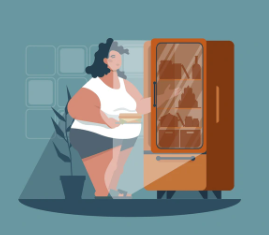
In the United States, millions of people start new diets every year, hoping to lose weight and improve their health.
But studies show that a large percentage of these diets don’t last — and even if some weight is lost, it often comes back.
Why do so many diets fail? Let’s explore the top five reasons and what you can do to avoid these pitfalls.
1️⃣ Unrealistic Expectations
Many people start a diet expecting dramatic results within a few days or weeks.
When the results don’t come fast enough, frustration sets in, and motivation fades.
✅ How to fix it:
Set small, realistic goals. Celebrate small milestones so you stay motivated.

2️⃣ Extreme Restrictions
Cutting out entire food groups or eating far too few calories might work short‑term, but it’s not sustainable.
Cravings build up, energy drops, and the diet eventually fails.
✅ How to fix it:
Follow a balanced plan that includes foods you enjoy in moderation.

Image for illustrative purposes only. Actual product or scene may differ from the real one.
3️⃣ Lack of Personalized Planning
A diet that worked for someone else might not fit your own lifestyle or needs.
Your activity level, health conditions, and food preferences matter.
✅ How to fix it:
Build a plan that matches your daily routine and unique goals.

4️⃣ Emotional Eating
Stress, boredom, or sadness often lead to eating even when you’re not hungry, which can derail any diet.
✅ How to fix it:
Find other ways to cope with emotions — go for a walk, write in a journal, or try meditation.

5️⃣ No Long‑Term Strategy
Many diets are treated as quick fixes. When the diet ends, old habits return, and so does the weight.
✅ How to fix it:
Adopt sustainable habits you can keep for years, not just weeks.

✅ Conclusion
Diets fail not because people are weak, but because many plans are built on short-term thinking and unrealistic promises.
By setting realistic goals, avoiding extreme restrictions, personalizing your plan, managing emotional eating, and focusing on long-term habits, you can finally build a healthy lifestyle that lasts.
✨ Remember: Your health journey is a marathon, not a sprint. Take it step by step, and you’ll see lasting results!